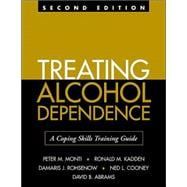This book presents a straightforward, multi-session coping skills training program that has been proven effective in helping alcohol-dependent individuals. The volume provides everything needed to implement the program, including a clear theoretical and empirical rationale, step-by-step session guidelines, helpful clinical pointers, and more than 40 reproducible client handouts, assessment instruments, and therapist forms. Sessions focus on developing key interpersonal and intrapersonal skills to help participants learn positive strategies for coping with the everyday demands of life and resisting the urge to drink.









